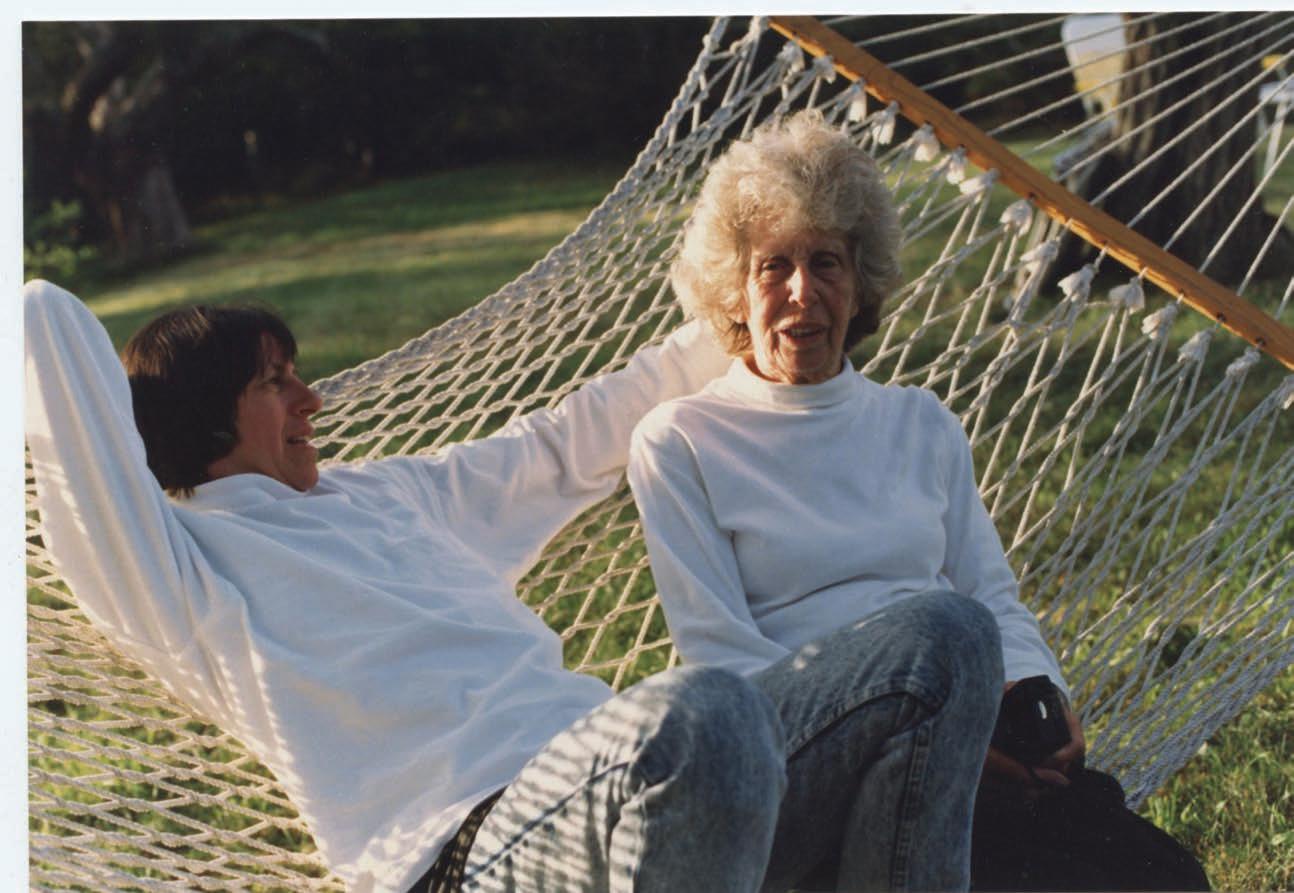
4 minute read
My Mother’s Pain, My Mother’s Resilience
ARTS&LIFE DOCUMENTARY
COURTESY OF VERONICA SELVER
Advertisement
Susan Fanshel always will remember one important characteristic of the late mother of her best friend, Veronica Selver and Irmi Selver, c. 1991. BOTTOM: Susan Fanshel and Irmi Selver Veronica Selver. When the two also taken in 1991. friends were teens and summerMy ing near the Atlantic Ocean, Irmi Selver invariably would walk along the coastline as they swam, watching them with a compelling intensity. Fanshel could sense anxiety in the woman’s expresMother’s Pain, My Mother’s Resilience

Documentary explores Holocaust survivor’s grief — and love of life.
SUZANNE CHESSLER
CONTRIBUTING WRITER
DETAILS
Irmi can be seen beginning Tuesday Jan. 26, as part of the New York Jewish Film Festival. The festival, running Jan. 13-26, features each film beginning at noon on the specified date and holding for 72 hours. $12 each. Listings and reservation information are available by accessing filmlinc.org or calling (212) 875-5367.

sion, but she did not understand fully until decades later, after reading Irmi’s memoir meant for those who knew her well.
Irmi described growing up in Germany, moving to other countries in escape of the Nazi onslaught and settling in America with a husband and two daughters. Most heart-wrenching was the part about traveling from Europe to Chile on a boat that hit Nazi explosives; Irmi was the only survivor of her earlier family, which had included a beloved husband, young son and younger daughter.
Fanshel, who settled in New York, and Veronica Selver, who moved to California, came to share career goals that recently joined them in letting others know about Irmi’s fortitude, which could not be squelched.
Now professional colleagues as filmmakers, the two have revealed a biography in a film appropriately titled Irmi.
The film is being spotlighted Tuesday, Jan. 26, as the last feature of the New York Jewish Film Festival, which this year is available to a wider audience because of digital presentations necessitated by the pandemic. The lineup, running Jan. 13-26, showcases 17 features and seven shorts.
“I feel my mother lives on when people experience her presence and spirit,” said Selver, who has specialized in social issue documentaries and whose credits include KPFA on the Air, Raising the Roof and Cape Song. “Her story is an important part of Jewish history, and I feel very strongly about that.”
The narration for the film, which delves into how Irmi connected with people and worked into her 80s, resulted from audio interviews Selver had with Fanshel, whose earlier documentaries include Nevelson in Process, Made in the Bronx and A Weave of Time, The Story of a Navajo Family. Much of the personal video came from the camera Selver often carried with her.
Selver, who began the film before Fanshel joined the project, was the fundraiser and found the team. Both women looked for archival material to set the historical background and jointly did the editing.
FEELING HER LOSS
“What I discovered in the course of making the film is that, for the first time, I could experience my mother’s pain,” Selver said. “As we were growing up, my sister and I were very close and determined to avoid resurrecting that because we wanted to keep her from living it again. We didn’t deny it, but we kept it under wraps.
“When the film gets to the passage about losing her family, I get to cry. That has been my own release of pain. Interviewing my sister for the film, I discovered how she carried the same weight of all my mother went through.”
Fanshel personally holds many positive reactions to Irmi.
“As Irmi’s story unfolds, I think it becomes increasingly moving because she was a woman who seemed to rise to every occasion in ways that are very moving,” Fanshel said.
“I hope the audience is moved by Irmi’s experiences and uplifted by her resilience and her joie de vivre. Irmi had a generosity of humanness. She really enjoyed people and made them feel special.
“Irmi wasn’t just resilient,” she added. “Instead of closing her down, [her tragic experiences] made her very empathetic and sensitive to creating real connections to people of all ages and all kinds. There was clearly something in her temperament that life brought out.”
That humanness and continuing contacts have played out in Ann Arbor through Irmi’s filmmaking daughter, who has visited the city to see the people so important to Irmi and then later generations.
Selver’s niece, Anna SelverKassell, who appears in the film, saw her aunt during years as a student at the University of Michigan. Emily Santer Joyce, who lives in Ann Arbor, traces the closeness of families to grandparents Trude and Max Victor, referenced in the film segment spanning years in Holland and England.
“I hope the film comes across showing the balance in Irmi’s nature, which reveals positive exuberance and gumption at the same time it maintains the presence of the loss she carried within her,” Selver said. “I believe Irmi shows you can overcome something but still carry it within you.”











